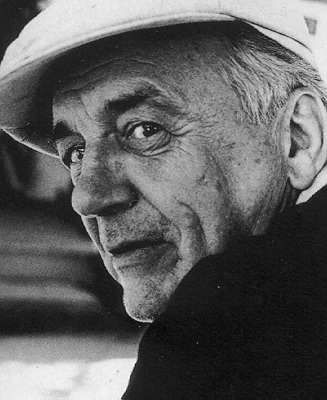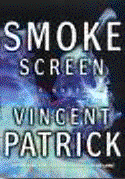|
 
PopEntertainment.com
> Feature Interviews P to T > Vincent Patrick

Vincent
Patrick
Putting
Up a Smoke Screen
by
Ronald Sklar
Copyright
©1999 PopEntertainment.com
All rights reserved. Revised:
April 28, 2022.
If you lead a squeaky clean (read: deadly
dull) existence, chances are the closest you'll ever get to an exhilarating, rewarding
life of crime is by reading the great works of Vincent Patrick. His two previous novels, The
Pope of Greenwich Village and Family Business, have easily become cult
classics, testosterone charged with male swagger that's tough as a fifty-cent steak. If
you're among the sheep reading Grisham and Clancy, get your sorry ass over to the
bookstore and demand Patrick instead. What the hell's the matter with you?
You'll need to start with his first two novels,
which will psyche you for his new one, called Smoke Signals. All three of these
rough diamonds glitter with glorious lowlifes, street scum and the most extraordinary of
regular people. In every bite, you have your neighborhood toughs and off-center
whackadoos, usually caught up in circumstances and schemes that have spun out of control.
You never know what's lying around the corner for these guys, unless, of course you've
already seen the movie. Needless to say, you'll be quoting from these characters for the
rest of your boring-ass life, while waiting in your express line or standing like an idiot
in your morning shower. Vincent Patrick is da man who gave the world such great lines as
"dey cut off my tum, Chaa-ley," "cop shit his pants," and other
delectable quotables.
"Crime attracts me," he admits in a
recent phone interview with me, which, by the way, was a high point of my pointless
existence. He says, "I'm always busy trying to present those characters in a way
they're not usually perceived by most people.
"There's something about that whole kind of
outsider hustler thing. I've gone out of my way to be around people like that, providing I
could keep the right distance. In fact, keeping the right distance is a sort of dance in
itself, where you become friendly with some of those guys but you never quite let your
guard down to get caught up in it."
The only real crime Vincent Patrick has
committed is procrastination between novels: fourteen years, to be less than precise.
Withholding genius like that is a crime on a grand scale. However, his new one, Smoke
Screen, is entirely worth the wait. Smoke Screen is Pope on an
international stage, with the usual neighborhood joes talking their talk and walking their
walk. This time, however, his world expands to include the President of the United States,
a Cuban doctor, the CIA, national security and a deadly virus about to be released on an
unsuspecting public. I won't give anything away, but let's just say that
"unpredictable" is describing it mildly.
Patrick says he got the urge to "try a
thriller," which is odd considering that his first two books are two of the most
thrilling reads you'll ever do. He also decided to try biting off more than he can chew
(and succeeding) as he expands his stage beyond da neighborhood to places as alien to his
characters as The Museum of Natural History. His task included exhaustive research on
subjects as diverse as African expeditions, modern day Cuba, and jewel heists.

He describes his research akin to " an
old-time movie where you actually see something that you didn't know about. Because these
days, everything is on television. There's no place left to go where you're saying, 'I
never saw that.' "
Smoke Screen also takes us into a place that
for the last year, anyway has been the source of punchlines and monologues: the Oval
Office. However, what is transpiring in this story has very little to do with cigars and
everything to do with Cuba. "I was most fearful of the whole oval office
section," he recounts. "I was frightened because it was so hard to do in even a
mildly believable way. For the first time, I was dealing with characters who allowed me a
much more intelligent and somewhat broader knowledge. In the first two books, we're
dealing with people in a much more limited world. Given where they were, it was really
people seeing the world from a neighborhood viewpoint. Here, suddenly, there was all this
opportunity to begin exploring a lot of factual stuff that you accumulate over the years
and attitudes toward life. In one sense, I feel that the pure craft level is the best I've
done. I'm not sure that the whole novel holds up to the first one because it's simply not
as serious. It was more fun to write in the sense that I was suddenly expounding on all
sorts of little things that I didn't have room for in the others."
Does that mean that our Vincent has gone
Hollywood? After all, he's also a well-respected screenwriter, creating the scripts for
both his novels and helping to create The Devil's Own, among other credits. Let's
just say that "they're talking" about bringing Smoke Screen to the Big
Screen, and we can only pray that they pay him to write the screenplay.
The Hollywood creative process has left a
somewhat bad taste in his mouth, but he has come out largely unscathed. He also claims
that the Hollywood stereotypes are correct.
"It's pretty much what people think it
is," he says. "It's a business and the people running it recognize it as such.
Unless you change the whole scheme of things, then everything flows out of that. To say
that it's outrageous that they don't put their money into higher quality movies is
ridiculous. If your Keough plan owns a lot of Fox stock, are you sure you want them to put
a lot of money into so-called quality movies? It just doesn't happen. The personal
morality can be pretty terrible, people can be pretty cutthroat, but it all flows out of a
fundamental decision to generate a lot of money. And nobody really knows what will work
and what won't. If they did, they would make money on every movie."
With cool influences like Nelson Algrin (The
Man with the Golden Arm, Walk on the Wild Side) and Joseph Conrad, Patrick knew
he was going to be a novelist since the fifth grade. Of course, he first took a necessary
detour into the real world, trying his hand at everything from bartending to engineering.
This is, I think, what separates real men like Patrick from lightweight hacks like John
Updike, who claims to never have had a real job in his entire life. Patrick's characters
have a workaday realism to them, smelling of everything but fruity literary pretension.
It's as if they have all had their share of punching the clock.
He says, "From early on, I always assumed
that I would never earn a living at writing. I assumed that you weren't even supposed to.
This was back at a time when if a book was on the bestseller list, it was considered
garbage, that it couldn't possibly be good. I just assumed that what you did was go out
and work and got a lot of experience and saw life and earned some money."
He was published for the first time in his early
40s ("It all flipped at once," he recalls. "It all came crashing in with
the both the movie sale and the paperback sale.").
The Pope of Greenwich Village
both the
novel and the movie caused a minor sensation when it was unleashed in 1979 and 1984,
respectively. Unfortunately, I have a bit of devastating news to Pope-heads: don't hold
your breath for a Pope sequel. Sorry. Buck up and move on.
"I always thought of sequels as kind of
crass commercialization," he says. "I never for a minute had any intention of
[writing a sequel]. I don't see the sequel waiting. It's funny how people immediately read
stuff in."
In the fourteen years since he's been gone, a
lot has changed in the publishing business. He says, "More than ever, there's an
overwhelmingly large amount of competition out there. The number of books that keep
pouring out is endless. Your window of doing something is so brief. It's very hard for a
book to get out and sit for a while and develop a following at any easy pace. It's like
movies: they open a movie on a weekend and on Monday they tell you if it's a hit or a
failure and here's how long it's going to be around. Publishing is heading in that
direction too."
That's where it's up to us, kids. Let's make
sure Vincent Patrick stays around for a long time. He admits that another, smaller novel
is in the works ("but I haven't quite gotten the right handle on it yet.").
Let's hope we don't have to wait another fourteen years for our next thrill.
Copyright
©1999 PopEntertainment.com
All rights reserved. Revised:
April 28, 2022. |